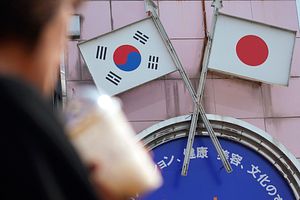Despite trade tensions between South Korea and Japan, recent events had suggested there might be an amicable way forward. That became more difficult with South Korea’s decision to end its bilateral intelligence sharing agreement with Japan, adding a new level of uncertainty to the crisis.
Prior to South Korea’s decision not to renew its intelligence sharing pact with Japan, the Japanese government had taken the initial tentative step of issuing licenses for two chemicals critical for South Korea’s electronics industry that have been under new national security restrictions since July.
At the same time, South Korean President Moon Jae-in left the door open for talks in his Liberation Day Address rather than taking a more strident nationalistic tone with Japan, while the two countries’ foreign ministers had agreed on the need for talks to address the historical issue underpinning the dispute.
In this context, South Korea’s decision not to renew the General Security of Military Information Agreement (GSOMIA), which facilitated intelligence sharing between the two countries, is perplexing — especially in light of North Korea’s recent missile tests.
Originally signed in 2016, GSOMIA was controversial even then. At the time, 59 percent of the South Korean public opposed the agreement. However, despite the current tensions between South Korea and Japan, only 47.7 percent of South Koreans initially supported ending the agreement (though since South Korea announced its decision those numbers have risen to nearly 55 percent).
Long supported by the United States to help improve trilateral cooperation, GSOMIA provided a direct line for South Korea and Japan to share intelligence on North Korea and other security issues in the region. The pact also helped South Korea and Japan cover gaps in their own intelligence gathering on North Korea. Japan was able to provide South Korea data on long-range missile tests that South Korea is unable to track, while South Korea has human intelligence resources in the North that Japan cannot replicate.
While the end of GSOMIA will make intelligence sharing less efficient, it does not mean the end of intelligence sharing between South Korea and Japan. GSOMIA itself does not expire for 90 days, and in the short term South Korea has agreed to provide Japan intelligence on North Korea’s most recent missile launch.
In the long term, intelligence sharing can take place through other means. The United States, South Korea, and Japan are all party to the Trilateral Information-Sharing Agreement (TISA). However, the TISA covers a narrower range of information than GSOMIA and requires the South Korea and Japan to use the United States as an intermediary for intelligence sharing, potentially slowing cooperation during a crisis. It will also make it more difficult to respond to other challenges such as the recent incursion by China and Russia into South Korean airspace.
Unsurprisingly, Seoul’s move was not welcomed in either Washington or Tokyo. A U.S. Department of Defense official expressed “strong concern and disappointment,” while Japanese Foreign Minister Taro Kono suggested that South Korea does not grasp the regional security situation.
While the decision itself is focused on intelligence sharing, the implications are wider. The withdrawal from GSOMIA has already added to the economic uncertainty in South Korea, and how the current crisis develops will partially depend on how Japan handles the licensing of exports to South Korea under national security restrictions and the new items that will require licenses when South Korea formally falls off Japan’s “white list” on August 28.
In his remarks on South Korea’s decision, Kono suggested that the current trade dispute should not be linked to the intelligence sharing agreement. However, intentional or not, the two issues had already been linked by Japan’s suggestion that South Korea was not a trustworthy partner, allowing some in Seoul to argue that South Korea should not share intelligence with a country that does not trust it.
While South Korea has suggested that it will seek to deepen bilateral cooperation with the United States rather than pursue multilateral cooperation, the move also likely complicates relations with the United States. Washington already is pushing for South Korea to increase the amount it contributes to burden sharing from a little under $1 billion to reportedly $5 billion in the new Special Measures Agreement. Ending GSOMIA is a step in the wrong direction, away from defense cooperation.
While the United States may seek to make tactical moves on issues such as burden sharing, from a strategic perspective the deteriorating relations between Seoul and Tokyo also create complications for Washington. With an open rift developing between South Korea and Japan, it reduces the ability of the United States, South Korea, and Japan to work collaboratively to address the new security challenges presented by North Korea testing new weapons systems that threaten both Asian countries, and also to cooperate on future denuclearization talks with North Korea.
Perhaps of most concern for the United States is that each ally has ignored calls from U.S. officials not to escalate the current situation. Restoring a sense of restraint will need to be a first step.
U.S. Secretary of State Mike Pompeo has suggested as much in remarking, “There is no doubt that the shared interests of Japan and South Korea are important, and they’re important to the United States of America…We hope each of those two countries can begin to put that relationship back in exactly the right place.” The United States may need to consider taking a more active role in resolving the conflict than it has to date if Washington wants to protect cooperation on those “shared interests.”
Resolving the current crisis will take time and will require compromise from both sides. Getting to the “right place” Pompeo suggested will necessitate accepting that multiple issues between South Korea and Japan are now linked and that resolving one will require making progress on all.

































